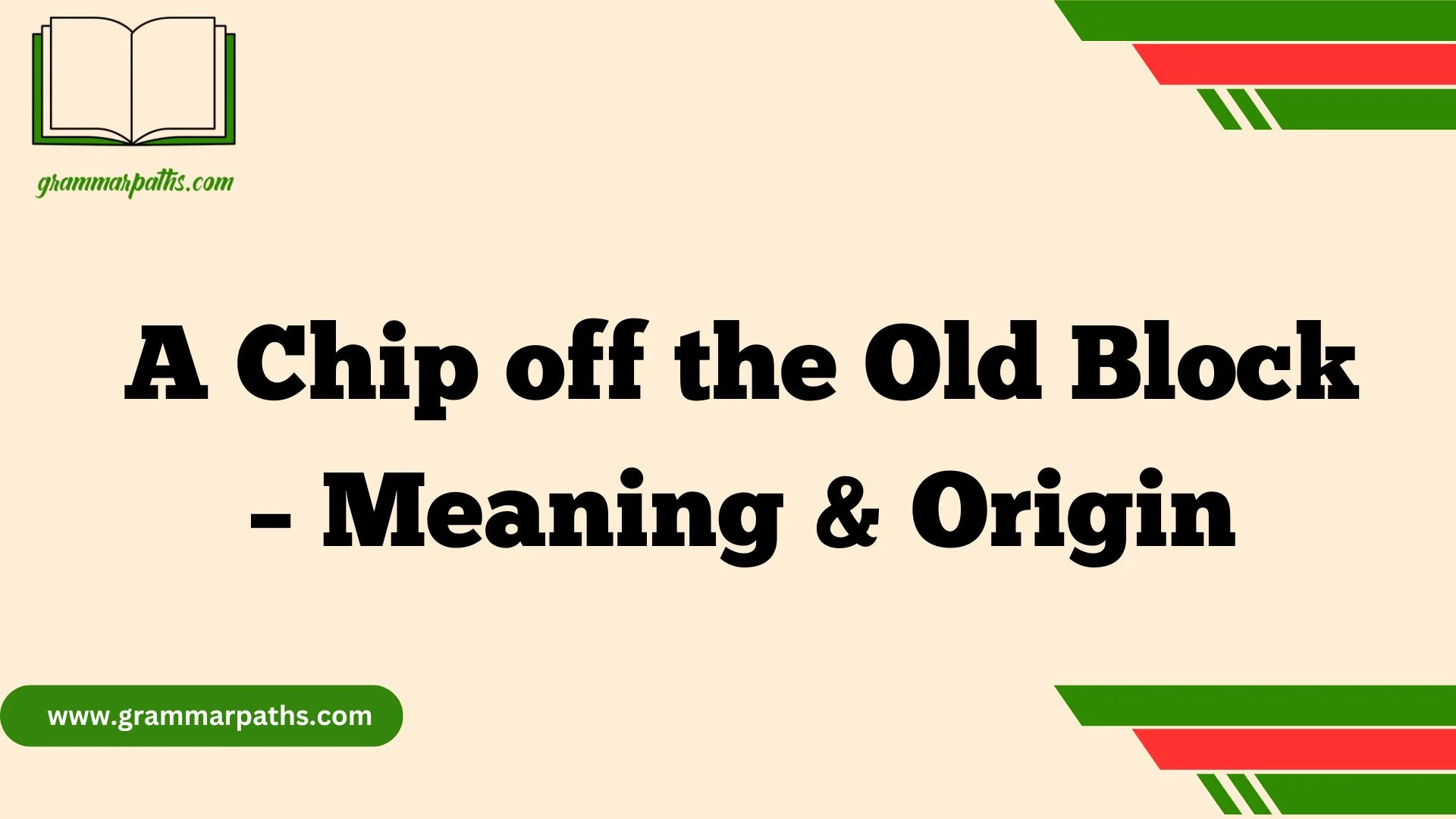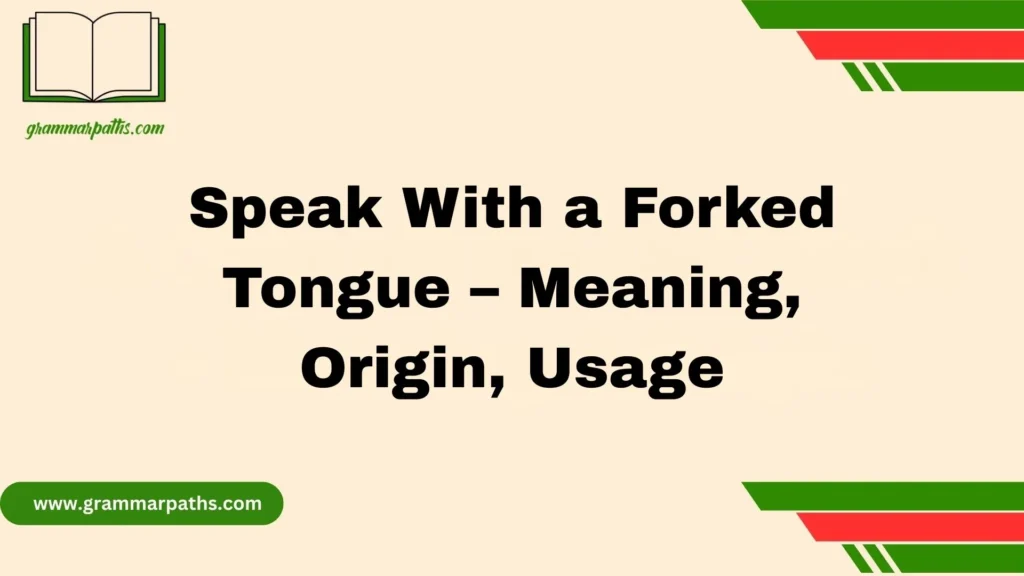Over the years of working with language, I’ve come to see that idioms like “A Chip off the Old Block” are more than just catchy phrases – they’re a reflection of culture and connection. This one, in particular, beautifully captures how traits, habits, and personalities pass down through generations. I’ve seen it firsthand – families who share little quirks, the same laugh, or a familiar way of speaking. It’s those small, familiar moments that make this idiom feel so real and heartfelt.
You’ll hear it in everyday conversations, or find it woven into classic literature, often used to describe someone who’s just like their parents – not only in looks but in character and spirit. That’s what gives it lasting power.
When you take a closer look at where this expression comes from, its meaning becomes even clearer. It speaks to the deep identity threads that connect us to our roots – something I often notice while editing personal stories and reflections. What’s fascinating is how idioms like this evolve over time, showing up in new ways across generations and media, but still keeping their original warmth and meaning.
By using them thoughtfully today, we’re not just speaking colourfully – we’re also keeping language alive, honouring its roots, and reminding ourselves of the family ties and stories that shape who we are.
What Does “A Chip off the Old Block” Mean?
The idiom a chip off the old block is used to describe someone who closely resembles one of their parents, particularly in terms of behavior, personality, or character—not just looks.
“He’s such a chip off the old block—always tinkering with machines just like his dad.”
Key Meanings:
- A person who acts or behaves like one of their parents.
- Someone who shares traits—values, skills, or habits—with their parent.
- Often used positively, but occasionally neutral or humorous.
Everyday Examples:
- “Your daughter’s got your sarcasm. She’s a real chip off the old block!”
- “He’s following in his father’s footsteps in law—clearly a chip off the old block.”
Why Do Idioms Like This Matter?
Idioms are linguistic time capsules. They carry meanings, emotions, and cultural values from one era to another.
Why Idioms Stay Relevant:
- They condense complex emotions or observations into relatable phrases.
- Idioms connect generations—you’ve probably heard this phrase from a grandparent.
- They enrich everyday language, adding color and personality to conversations.
According to the Cambridge Dictionary, idioms reflect the cultural wisdom of a language. Saying “a chip off the old block” tells a story in just a few words.
Origin and Historical Development
The roots of a chip off the old block trace back to woodworking metaphors common in the 16th and 17th centuries, where a “block” referred to a piece of wood from which smaller “chips” were cut. These chips, of course, resembled the block.
Early Usage:
- First recorded variant: “chip of the same block” – found in a sermon by Bishop Robert Sanderson in 1658.
- Modern phrasing: “A chip off the old block” began appearing in literature around the 19th century, particularly in American English.
Historical Reference:
“I am not ashamed to acknowledge myself a chip of the old block.”
— John Randolph, American politician, 1817
Family and Generational Contexts Explored
Idioms like a chip off the old block thrive in family dynamics, especially when children mirror their parents in specific ways.
Key Areas of Similarity:
| Trait Type | Common Examples |
| Personality | Temperament, humor, ambition |
| Behavior | Work ethic, communication, habits |
| Skills/Talents | Musical ability, sports, technical skills |
| Values & Beliefs | Political stance, ethics, traditions |
Famous Generational Examples:
- Ken Griffey Sr. and Ken Griffey Jr. – Both professional baseball players with similar batting styles.
- Martin Sheen and Charlie Sheen – Actors with similar on-screen charisma and off-screen controversies.
- Jaden and Will Smith – Known for their talent in acting and music, echoing each other’s creative energy.
Nature vs. Nurture: The Heart of the Idiom
This phrase naturally opens up the age-old debate: Are we shaped more by our genes or by our environment?
Nature (Genetics):
- Traits passed down biologically.
- “She has her mother’s eyes and her father’s stubborn streak.”
Nurture (Environment):
- Learned behaviors, speech patterns, values.
- “He walks and talks just like his dad because they’re always together.”
Blend of Both:
Most cases involve both factors. That’s what gives a chip off the old block its strength—it’s accurate and flexible.
When the Idiom Fits—and When It Doesn’t
When It Fits:
- A child pursues the same career as a parent.
- Behavioral quirks or speech patterns are clearly inherited.
- Shared hobbies, such as fishing, painting, or politics.
When It Doesn’t Fit:
- A child intentionally rebels against their parent’s legacy.
- Drastically different lifestyles or beliefs.
- Adopted children who don’t share biological traits.
“You’d expect her to be a chip off the old block, but she couldn’t be more different from her father.”
Literary, Film, and Media Examples
The phrase has made its way into books, movies, and pop culture, reinforcing its message in storytelling.
Literary Uses:
- “Great Expectations” by Charles Dickens – Characters like Pip often mirror their mentors and guardians.
- “To Kill a Mockingbird” by Harper Lee – Scout reflects Atticus’s values and integrity—a true chip off the old block.
Film and TV References:
| Media Title | Usage Context |
| The Lion King (1994) | Simba mirrors Mufasa’s leadership qualities. |
| Finding Nemo (2003) | Nemo defies his father but also shows his bravery. |
| Succession (HBO Series) | All three Roy siblings reflect Logan Roy in different ways—ambition, ruthlessness, and emotional distance. |
| The Simpsons | Bart inherits Homer’s recklessness but also his loyalty. |
Practical Tips for Using “A Chip off the Old Block”
While it’s a familiar phrase, using it the right way matters.
Best Contexts:
- Describing family resemblance.
- Complimenting inherited talent.
- Light-hearted observations.
Tone Matters:
- Can be humorous, admiring, or even ironic.
- Usually informal and spoken.
Sample Sentences:
- “You should see her cook—she’s a chip off the old block!”
- “He just negotiated that deal like a pro. Definitely a chip off the old block.”
Related Idioms About Family Resemblance
There are several idioms that express similar ideas. Here’s how they compare:
| Idiom | Meaning | When to Use |
| The apple doesn’t fall far from the tree | A child closely resembles their parent | General traits or behaviors |
| Like father, like son | Sons often emulate their fathers | Specific male lineage comparisons |
| Spitting image | Exact physical resemblance | Visual similarities |
| Runs in the family | A characteristic common to many family members | Skills, professions, health conditions |
| Cut from the same cloth | Very similar in nature or behavior | Broader use—not just family |
Comparison Table:Why “A Chip off the Old Block” Remains Relevant Today
Despite being centuries old, this idiom still holds its place in modern speech.
Why It Sticks:
- Families remain a central part of identity.
- Resemblance—physical, emotional, behavioral—is universal.
- Media continues to highlight parent-child parallels.
- Social media makes comparisons more visible (TikTok trends, “Just like Dad” videos, etc.)
Conclusion: Why “A Chip off the Old Block” Still Matters
Language is full of expressions that help us say more with less, and “a chip off the old block” is one that continues to resonate across generations. It’s not just about family resemblance – it’s about the way character, values, and spirit can be passed down from parent to child.
Whether you hear it in casual conversation, see it in literature, or use it to describe someone you know, this idiom offers a warm, relatable way to express legacy and connection. It reminds us that language grows with us, and by using phrases like this, we’re keeping those family stories and traditions alive in everyday speech.
FAQs About “A Chip off the Old Block”
Q1: What does “a chip off the old block” mean?
A: It means someone who closely resembles one of their parents, especially in personality, behavior, or appearance. It’s often used with affection to describe inherited traits.
Q2: Where did this idiom come from? A:
The phrase likely evolved from older sayings in the 17th century, such as “a chip of the same block,” referring to a small piece cut from the same stone. It eventually took on a more familial meaning, describing people cut from the same “block” as their parents.
Q3: Is the phrase used in both formal and informal situations?
A: It’s mostly used in casual or conversational contexts, but it can show up in writing, speeches, or literature to convey warmth or a personal connection.
Q4: Can this idiom be used for daughters, or is it only for sons?
A: While it’s often used for sons, it absolutely applies to daughters as well. Anyone who shares a noticeable likeness to a parent can be described this way, regardless of gender.
Q5: Are there other idioms with similar meanings?
A: Yes! Phrases like “like father, like son”, “the apple doesn’t fall far from the tree”, or even “runs in the family” all express similar ideas about familial traits being passed down.
Q6: Why do idioms like this matter in modern language?
A: Idioms carry cultural memory, express emotion in a compact way, and help us feel more connected to our past and each other. Using them keeps language rich, expressive, and alive.
Additional Resources and References
- Merriam-Webster Dictionary: Chip off the old block
- Oxford English Dictionary – Historical Use of Idioms
- Psychology Today: Nature vs Nurture Debate
- Cambridge Dictionary – Idioms
Table Recap: Similar Idioms
| Expression | Use Case Example |
| Chip off the old block | “He’s calm under pressure—just like Mom.” |
| The apple doesn’t fall far… | “Both are terrible drivers.” |
| Like father, like son | “They even chew the same way.” |
| Spitting image | “She looks exactly like her grandmother.” |
| Runs in the family | “Every one of them’s a teacher.” |

Grace Marie is the dedicated writer behind GrammarPaths.com, where she shares her passion for English grammar, idioms, and writing mastery. With a strong background in language studies and years of experience helping learners improve their communication skills, Grace creates clear, practical, and engaging content that makes English easy to understand.












